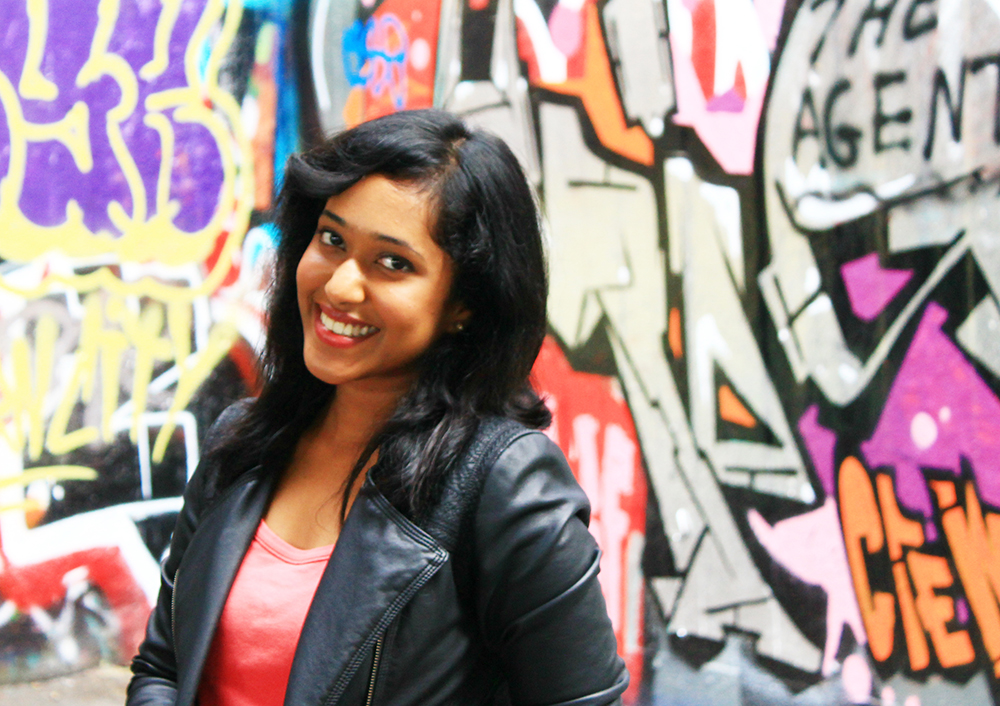Our LCFMA16 Graduate Spotlight series has celebrated the wealth of talent and diversity from this year’s postgraduate cohort and the latest to be featured is MA Fashion Entrepreneurship and Innovation student Sneha Adichazhi Valappil.
After completing her Bachelors, Sneha worked as a fashion designer back in India before moving to the Netherlands. Having gotten to grips with how cut-throat the fashion industry can be, Sneha wanted to better position herself by learning more about the entrepreneurship and innovation side of fashion some applied to study at LCF. Find out why she wanted to move to London, and how she worked on 3D-printing techniques at Alexander McQueen below.

MA Fashion Entrepreneurship and Innovation student Sneha Adichazhi Valappil.
Where and what did you study prior to your MA at LCF?
I completed my Bachelors in Fashion Design from National Institute of Fashion Technology (NIFT) India. After my Bachelors, I worked as womenswear designer for fashion companies in India and Netherlands.
What made you want to study an MA Fashion Entrepreneurship and Innovation?
My exposure to fashion as a designer taught me the industry is cut-throat, apart from its creative side. This was why I wanted to pursue a Masters course that combines fashion and business. When I researched prospective courses, MA Entrepreneurship and Innovation proved unique as it covers every element required to build a business in fashion. I knew it would be vital for me when I have to start my own brand in future.
Why did you choose LCF and MA Fashion Entrepreneurship and Innovation?
LCF was my top choice when I decided to do Masters because of its global recognition. It is one of the best fashion schools in the world, particularly for postgraduate study in Business & Management. Also, being in a world city and a fashion capital like London assured to be an enriching experience.
Did you always want to go into the entrepreneurship and innovation side of fashion, or did you consider being a designer?
I am a creative individual and I love being in the creative side of fashion. Innovation is essentially a continually evolving field just like fashion. I have always wanted to start my own business. India is currently experiencing an entrepreneurial boom, so its a wonderful time for start-ups. This course has developed my understanding of the creative and business elements of fashion, this should hopefully allow me to work for a fashion brand or even start my own.
Tell us about your final year project?
My dissertation looked at the feasibility of a business-to-business trend analysis service for apparel retailers in India. Apparel business is growing fast in India with many homegrown and international brands coming in. Although the country has a distinct fashion sensibility, retailers in India still follow global trend forecast services that are Western-centric due to the lack of indigenous services. My project explored the market gap by studying the B2B needs for such a service, and developed a unique service with the application of Big Data Analytics.
What other projects have you worked on during your time at LCF?
I worked on a group collaborative project with LCF’s Centre for Sustainable Fashion and Kering, where a slow consumption business model involving the use of Kombucha leather was proposed for Stella McCartney and Bottega Veneta.
I was also selected for the Kering Award Mentoring scheme – I worked on 3D-printing, using bioplastics and recycled materials for Alexander McQueen. I also worked on another group project for London-based startup Kempes. I also aided in strategy development for the a new London brand based on detailed market analysis.
What did you find the most interesting and challenging parts of the course?
The kind of exposure I got during the course was unparalleled. LCF provided so many opportunities to interact with inspiring personalities from the industry as well as academia. We also had industry trips that were very insightful. The course was self-directed and this was very challenging initially. This wasn’t the kind of teaching I’m used too and there were times I felt lost. However, this method brought out the best in me, and proved to be most efficient and effective.
What advice would you give to anyone considering studying an MA at LCF?
My advice to prospective MA Entrepreneurship and Innovation is have a clear objective on what you want from the course. It will help to focus your energies from the very beginning and get the best out of it. At the same time, have an open mind and seize every opportunity. Try not to miss the industry talks, workshops etc. It might not seem relevant, but you never know where it will lead to!
What are your future plans?
Currently I am in Amsterdam trying to enhance my sustainable fashion and brand strategies. In the long term, I want to start my own business in India.

